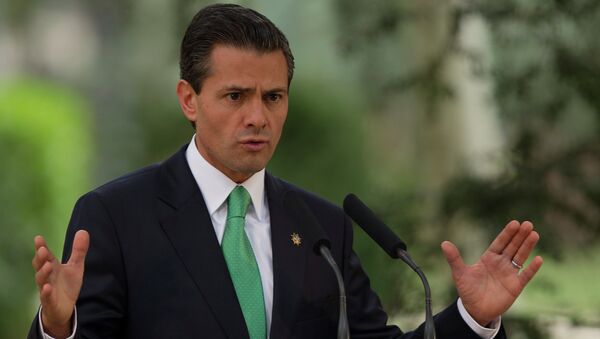MOSCOW, November 28 (Sputnik) — Mexican President Enrique Pena Nieto put forth a series of reforms to his country’s security forces on Thursday, proposing the restructuring of municipal police organizations following the kidnapping and murder of 43 college students in the southwestern city of Iguala on September 26.
The 10 point reform plan was announced in Nieto’s first broad policy statement on the subject since coming to office in 2012. He intends first and foremost to restructure the country’s police force, which presently consists of 2,438 municipal and 32 state forces. The plan proposes a consolidation of municipal forces, which would make them formally responsible to their respective states.
The proposed reforms, which will formally be sent to the Mexican Senate on Monday, also include plans for the creation of a national emergency service number (similar to 911 in the US), a national identification register for all Mexican citizens, and measures aimed at reinforcing protocols against extrajudicial executions by the Mexican police and military. The measures also propose the appointment of an anti-corruption attorney, to be appointed by the country’s Senate, and the toughening of legal sanctions against businesses that attempt to corrupt government authorities.
The president had earlier announced a national missing persons registry, along with a national victims registrar to document the tens of thousands killed and reported missing each year. Gang violence in the country has claimed the lives of at least 120,000 people since late 2006, with over 27,000 reported missing.
Introducing the plan, the president noted that “Mexico cannot continue like this,” referring to the murdered students, whose deaths sparked widespread protests and an international media furor. The president noted in his televised speech that the event’s “cruelty and barbarity have shocked Mexico.”
In line with Nieto’s economics-focused presidency, the 10-point plan also proposes the creation of special economic zones in the country’s impoverished south, where most of the violence takes place. Stating that the country’s regional divide may be responsible for the violence, Nieto noted that “today there are two Mexicos: One that is part of the global economy with growing levels of income, development and well-being; and then there is a poorer Mexico with historical problems that not been resolved for generations,” Reuters quoted him as saying.
The troubled southern states of Guerrero, Michoacan and Jalisco, as well as Tamaulipas, which borders Texas in the northeast, collectively known as the ‘hot lands’ for their extremely high levels of gang violence, are set to be the first to undergo reforms. There, municipal forces will be unified with state police forces within a year and a half, Presidential Chief of Staff Aurelio Nuno said. These states are also set to be provided with additional police forces.
Pedro Torres, a law professor at Tecnologico de Monterrey University noted that Mexicans are likely to react with skepticism toward the broad and somewhat vague reforms. "There is definitely nothing new here that they haven't tried to implement before," Torres told the Associated Press. "More than announcements, the public needs to see concrete actions that make this rhetoric seem believable."
Similar reforms were conducted in 2004 and 2008; however, it yielded few visible results in dealing with the country’s extreme levels of gang violence, or in addressing police collusion with local gangs.
President Nieto has been hesitant in seeking to address the problem of gang violence in his country. The students’ disappearance two months ago has led to mass protests and calls for his resignation. A mass demonstration in Mexico City earlier this month on the anniversary of the Mexican Revolution saw the burning of an enormous effigy of Nieto.
Journalist Jack M. Ackerman noted in a Foreign Policy article published Wednesday that Nieto has failed to take responsibility in the case of the missing students, and that his administration has been criminally inept at investigating not only the murders of innocents, but also the frequent complicity of local, state and federal officials in gang killings and violence, as is allegedly the case with the 43 students. Furthermore, Ackerman criticized the Obama Administration’s failure to censure Nieto in any way for failing to address the corruption, the civil rights abuses and attacks on the press, which have become a regular occurrence over the last couple of years.


